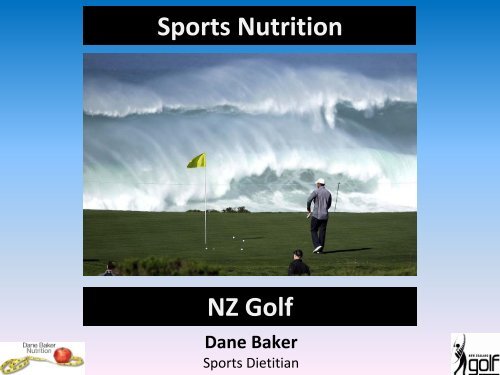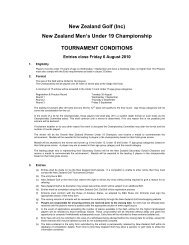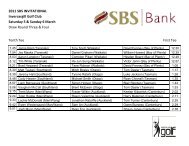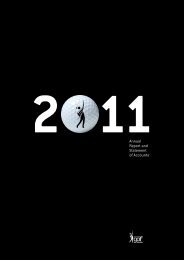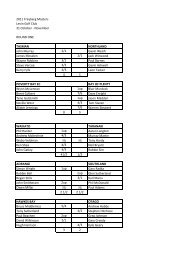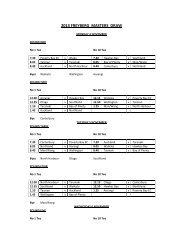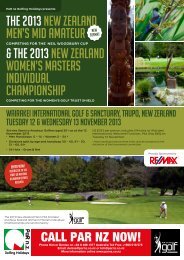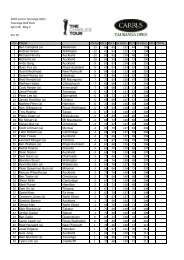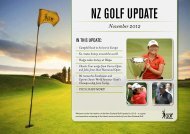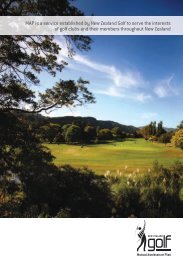NZ Golf
Srixon Academy nutrition presentation - May 2012 - New Zealand Golf
Srixon Academy nutrition presentation - May 2012 - New Zealand Golf
- No tags were found...
You also want an ePaper? Increase the reach of your titles
YUMPU automatically turns print PDFs into web optimized ePapers that Google loves.
Sports Nutrition<br />
<strong>NZ</strong> <strong>Golf</strong><br />
Dane Baker<br />
Sports Dietitian
Today’s Presentation<br />
• Role of nutrition<br />
• The basics of nutrients<br />
• Carbohydrates<br />
• Protein<br />
• Hydration<br />
• Break – Group activity<br />
• Daily timeline<br />
• Caffeine<br />
• Sleep
My Role<br />
• To work individually with each athlete to create<br />
nutrition strategies that work best for each athlete.<br />
• “Nutrition won’t make an average athlete great<br />
but it can make a great athlete average”<br />
danebakernutrition.com
Role of Sports Nutrition<br />
“Life as an elite athlete revolves around recovery and<br />
performance from one session to the next.<br />
►<br />
Need to focus on day to day nutrition<br />
(during and recovery from exercise)<br />
rather than just competition!
The four R’s of Recovery<br />
Refuel<br />
Carbohydrates<br />
Repair<br />
Protein<br />
Rehydrate<br />
Fluid<br />
Rest<br />
danebakernutrition.com
Food Pyramid<br />
Fats & Sweets<br />
Protein<br />
Carbohydrates
Carbohydrate, Protein or fat??<br />
Carb<br />
Fat<br />
Protein<br />
Protein<br />
Protein + Carb<br />
Carb<br />
Carb<br />
Protein + Carb<br />
Carb<br />
Carb<br />
Fat<br />
Carb + Protein
Refuel - Carbohydrates<br />
Fuel your muscles<br />
Carbohydrates<br />
• Carbohydrates are the main fuel for your muscles during exercise.<br />
• You can only store a limited amount of carbohydrate (glycogen) in the body.<br />
• The harder you train; the more carbohydrate your muscles burn up.<br />
• Need to eat regularly to ensure your muscles have enough fuel.
Glycogen<br />
Full Tank<br />
(Fully rested & Eaten well)<br />
E<br />
F<br />
45mins exercise?<br />
(High intensity)<br />
danebakernutrition.com
Glycogen<br />
45mins exercise<br />
(High intensity)<br />
E<br />
F<br />
30% loss of fuel tank<br />
1.5 hours exercise?<br />
(High intensity)<br />
danebakernutrition.com
Glycogen<br />
2 hours + exercise?<br />
(High intensity)<br />
E<br />
F<br />
85% loss of fuel tank<br />
danebakernutrition.com
Fuel Utilization<br />
Van Loon et al. Journal of Physiology (2001), 536.1, pp.295–304
Glycogen and golfers<br />
• 30-40% VO2 max (average)<br />
• Lower end of glycogen usage<br />
• Over 4-5 hours this can add up<br />
danebakernutrition.com
Glycogen and golfers<br />
• Carbohydrate needed on<br />
course to maintain fuel and<br />
concentration<br />
• Ensure to start round<br />
in a well fed state<br />
(avoid missing meals)<br />
• If have previously exercised,<br />
need refuelling before<br />
practise or competition begins<br />
Ratings of perceived mental fatigue and tiredness significantly increase during a round of golf<br />
E.J, Stevenson., P.R, Hayes., S.J, Allison. (2008). The effect of a carbohydrate–caffeine sports drink on simulated golf performance. Appl. Physiol. Nutr. Metab. 34: 681–688
Running on Empty<br />
Fatigue & Tiredness<br />
Hard to Concentrate<br />
Reduced Skills &<br />
decision making<br />
Reduced Concentration<br />
- Application in learning /<br />
practising new skills<br />
Loss of muscle<br />
Impaired Immunity<br />
- more chance of getting sick
When do we need carbohydrate?<br />
(1.) Pre Exercise (2.) During Exercise (3.) Recovery<br />
Use familiar foods you know<br />
you will tolerate well<br />
Create regular routine you<br />
know works well for you<br />
Include a balance of<br />
carbohydrate with protein
Fuel during golf – why?<br />
Fatigue during simulated tennis matches – reduced ground stroke and<br />
serving accuracy without carbohydrate.<br />
Carbohydrate during soccer skill test improved shooting accuracy<br />
Carbohydrate during simulated golf round improved putting performance in<br />
last 6 holes and reduced feelings of mental fatigue and tiredness.<br />
Current recommendations are for 30g - 60g of carbohydrate<br />
per hour for intense exercise lasting longer than one hour<br />
1/2 bottle<br />
1 bottle<br />
Sports water<br />
Sports Drink 1 banana Muesli bar ½ sandwich<br />
1 large citrus fruit<br />
or 2 x medium size<br />
Small handful<br />
of dried fruit<br />
Develop routine that is regular and consistent and that works well for you!
Sports Drink - Fuel<br />
Provide Fluid & Carbohydrate<br />
Easily digested, similar to water<br />
Suitable:<br />
• Before exercise (if nervous pre competition)<br />
• During exercise<br />
• After exercise (if appetite limited)<br />
Also provides sodium (electrolytes) that<br />
water does not (is sodium in food though)<br />
Actual foods; flavoured milk, yoghurt, fruit<br />
can be more complete in recovery<br />
+ have more nutrients!
Protein<br />
Protein?<br />
danebakernutrition.com<br />
Re-build &<br />
Repair Muscles
Why we need protein<br />
• Your body is made up of proteins<br />
― Muscle<br />
― Skin<br />
― Organs (kidneys, heart, lungs etc)<br />
• These are broken down each day and need<br />
to be rebuilt<br />
• Protein needs to be rebuilt after exercise.<br />
danebakernutrition.com
Rate of muscle rebuilding<br />
Protein timing<br />
“Optimal muscle regeneration window”<br />
Protein into muscle<br />
Protein feeding<br />
Protein Balance in muscle<br />
Carbohydrate only<br />
Protein out of muscle<br />
Phillips & Tarnopolsky; 2010<br />
0 24 48<br />
Time post – exercise (hours)
Recovery needs<br />
• What 2 nutrients then do we need in recovery?<br />
Mainly Carbohydrate<br />
To refuel!<br />
Some Protein<br />
To rebuild<br />
Carbohydrates<br />
danebakernutrition.com
Carbohydrate & Protein snacks<br />
Good recovery options<br />
Lean meat<br />
sandwiches /<br />
filled rolls<br />
500ml<br />
flavoured<br />
milk<br />
250ml flavoured milk<br />
+ Banana<br />
Fruit<br />
Smoothie<br />
Breakfast<br />
Cereal<br />
+ milk<br />
Up & Go<br />
+ Muesli bar<br />
Small tin baked beans<br />
+ 2 x toast<br />
Fruit salad<br />
+ low fat yoghurt
Protein during golf – why?<br />
May help with mental concentration<br />
Can also provide some muscle rebuilding during 4-5 hour round<br />
Only need some, carbohydrate still the priority!<br />
Lean meat in sandwich<br />
Small handful<br />
of nuts<br />
1/2 bottle<br />
1 bottle<br />
Sports water<br />
Sports Drink 1 banana Muesli bar ½ sandwich<br />
1 large citrus fruit<br />
or 2 x medium size<br />
Small handful<br />
of dried fruit<br />
Develop routine that is regular and that you do for consistently and that works well for you!
Protein Supplements?<br />
• Provide convenient, high quality source of protein<br />
• Studies show protein (from milk), improves muscles growth after resistance training<br />
• Is not magic bullet that can undo poor nutrition habits.<br />
• 250-500mls of milk drink is a good alternative and will supply<br />
enough protein to stimulate muscle growth .<br />
• Protein shake not complete recovery still need carbohydrates!
Supplement Safety<br />
• Sports Drink and Basic Whey protein / meal replacement powder<br />
are only supplements needed unless otherwise educated by Sports<br />
Dietitian / Physician.<br />
• Use reputable brands to reduce the risk<br />
• Use Drug Free Sport if you are unsure of anything.<br />
www.drugfreesport.co.nz<br />
0800DRUGFREE<br />
danebakernutrition.com
danebakernutrition.com<br />
Hydration
Consequences of Dehydration<br />
• Reduced work capacity<br />
Increased heart rate<br />
• Increase perception of effort<br />
Everything seems harder<br />
• Increased body temperature<br />
Fatigue will occur faster<br />
• Reduced ability to concentrate<br />
Decision making, technique<br />
All factors lead to reduced performance!
Dehydration Symptoms<br />
►<br />
►<br />
►<br />
►<br />
►<br />
►<br />
►<br />
►<br />
Headache<br />
Light headed<br />
Fatigue<br />
Cranky<br />
Muscle cramps*<br />
Reduced concentration<br />
Poor co ordination<br />
Reduced mental skills<br />
danebakernutrition.com
Dehydration and skill<br />
• Soccer skill Performance maintained at 1.5%<br />
dehydration, compared to 2.4%<br />
• Basketball shooting drills declined progressively<br />
from 0-4% dehydration, significant impairment at 2%<br />
• Cricket bowling accuracy impaired at 2.8% dehydration<br />
compared to 0.5%<br />
2% dehydration in golfers (75kg golfers lost 1.5kg)<br />
↓ Target accuracy (4.1m v 7.9m)<br />
↓ Distance Control (4.8m v 8.4m)<br />
↓ Total distance (114.4 v 128.6m)<br />
Smith M.F., Newell A.J., Baker M.R (2011). EFFECT OF ACUTE MILD DEHYDRATION ON<br />
COGNITIVE-MOTOR PERFORMANCE IN GOLF. J STRENGTH COND RES. 2011 DEC 20
Measuring Hydration<br />
Weight before round<br />
_<br />
Weight after round<br />
75.0kgs<br />
73.5kgs<br />
= 1.5kgs of weight loss during round<br />
= 2% dehydration<br />
*Only drank 500mls during round<br />
If drank 1.5L during round – would have been 74.5kg after round<br />
and therefore only had been 0.6% dehydrated
How much to drink?<br />
Drink Regularly from the beginning of the round<br />
Intakes will vary significantly depending on climate<br />
(Hot and humid will result in more sweat loss)<br />
150-250ml every 15-20mins<br />
Always have drinks available<br />
If drinks are cold you will drink more<br />
Have an idea of fluid loss and an appropriate plan<br />
Sports drinks will also provide carbohydrate & sodium<br />
Keep dehydration to less than 2%
danebakernutrition.com<br />
Urine Colour
Practice day<br />
Hydration / snack<br />
11<br />
12<br />
1<br />
10<br />
2<br />
9<br />
3<br />
Breakfast / Recovery snack<br />
8<br />
4<br />
During round<br />
nutrition plan<br />
7<br />
6<br />
5<br />
or<br />
danebakernutrition.com
Tournament day<br />
Round<br />
During round<br />
nutrition plan<br />
11<br />
12<br />
1<br />
Snack / Hydrate<br />
10<br />
2<br />
Practice<br />
9<br />
3<br />
Lunch / Recovery<br />
8<br />
4<br />
7<br />
6<br />
5<br />
Recover / Repair<br />
Rehydrate<br />
danebakernutrition.com
The importance of sleep<br />
Doctors with less than 6 hours of sleep between<br />
procedures have twice the surgery complications<br />
Reducing your night time sleep by 1.5 hours<br />
impairs alertness by 32%<br />
Sleeping for just six hours a nigh increases<br />
the risk of being overweight by 17%<br />
Calorie consumption increases by 22%<br />
when sleeping only for 4 hours
11<br />
12<br />
1<br />
Sleep!!!!!<br />
9<br />
10<br />
Sleep!!!<br />
8-10 hours<br />
2<br />
3<br />
8<br />
4<br />
7<br />
6<br />
5<br />
danebakernutrition.com
danebakernutrition.com<br />
Caffeine
Performance effects of Caffeine<br />
Increase endurance by up to 10%<br />
(Time to exhaustion increases)<br />
Decreases feelings of exertion<br />
(Exercise seems easier)<br />
Increased performance in high intensity exercise<br />
(Improved 1500m running time)<br />
Improves measures of mental skills during exercise<br />
(Attention, motor skills, memory, decision making)<br />
Improved putting later in round & reduced feelings of fatigue<br />
* 15 handicaps golfers * No difference in heart rates
How does it work?<br />
• Increases muscle output in endurance exercise<br />
– Can increase work during a game<br />
• Stimulant effect on the brain<br />
– Exercise seems easier<br />
danebakernutrition.com
danebakernutrition.com<br />
How much caffeine is needed?
100 – 200mg of Caffeine<br />
• Smaller amounts of caffeine have recently shown to improve<br />
performance rather than very large doses<br />
100mg<br />
1 x<br />
Powerade<br />
Fuel +<br />
½ - 1 cup of coffee<br />
*Caffeine can vary<br />
1 x 100mg Tablet<br />
200mg<br />
2 x 100mg<br />
Tablet<br />
Powerade fuel +<br />
1 x 100mg tablet<br />
1 cup of coffee<br />
*Caffeine can vary
When to take it?<br />
• Caffeine takes 60-90mins to peak in blood<br />
• Half life lasts in body for up to 8 hours<br />
• It will not rise and crash quickly, making you feel<br />
flat – as often described in the media<br />
• Dehydration is not significant with caffeine, now<br />
proven<br />
danebakernutrition.com
Take home points!<br />
• Caffeine is very individual on its effect on the body<br />
• If going to use, make it part of your training program<br />
when playing and practising<br />
• Never try for the first time in a competition<br />
• Remember caffeine can vary significantly between<br />
brews so some may be a lot stronger than others<br />
• Don’t feel like you need to use caffeine,<br />
it’s individual!
Energy Drinks Pre Exercise?<br />
High sugar concentration – delays emptying from stomach<br />
- Can impair hydration<br />
- Can cause stomach pains<br />
- Use with caution and always try first
Summary<br />
Refuel<br />
Carbohydrates<br />
Repair<br />
Protein<br />
Rehydrate<br />
Fluid<br />
Rest<br />
Sleep<br />
danebakernutrition.com
Thank you<br />
Good websites:<br />
http://www.ausport.gov.au/ais/nutrition<br />
http://www.sportsdietitians.com.au/factsheets/<br />
danebakernutrition.com
danebakernutrition.com<br />
Questions?


